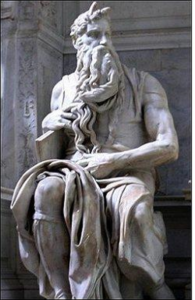 The giving of the law through Moses made a profound difference in the history of Israel. Its impact has had a substantial impact upon Western civilization and for this historic reason the Ten Commandments (Decalogue) have been rightly posted in many courtrooms in the United States and other countries.
The giving of the law through Moses made a profound difference in the history of Israel. Its impact has had a substantial impact upon Western civilization and for this historic reason the Ten Commandments (Decalogue) have been rightly posted in many courtrooms in the United States and other countries.
Although there had been prior written codes of law in other previous civilizations, here were laws that for the first time stood taller than men and defined transgressions as not merely an offense against society, but an offense to the revealed moral nature of God. Consequently, as God was making Himself known to the people of Israel, a worldview was taking shape in which it was understood that man was made in the image of God and accountable to Him.
This was in marked contrast to other civilizations. Egypt was ruled by Pharaoh. His arbitrary judgments were the law of the day. There was no written or codified law. His ‘might’ as Egypt’s pharaoh, determined what was ‘right’.
To the East, the Mesopotamian cultures had complex written codified legal systems, the oldest extant example dating from 2050 BC. It was a system for determining accurate weights and measures and underscored the right of Ur Nammu to rule as king over the region. Abraham, who hailed from Ur of the Chaldees must have known of the two tables of stone with Akkadian inscription dating from 1920 BC that codified property regulations laid down by the god Tishpak that were transmitted by their local king.
 The Code of Hammurabi, dating from 1728 BC, was found in Susa, and was impressively written on a six-foot diorite stone slab.
The Code of Hammurabi, dating from 1728 BC, was found in Susa, and was impressively written on a six-foot diorite stone slab.
The’ eye for an eye’, ‘tooth for tooth’ stipulation (Exodus 21:24-25) is often misunderstood. It simply means that the punishment must be commensurate to the crime, a strict upholding of compensation due according to the extent of injury.
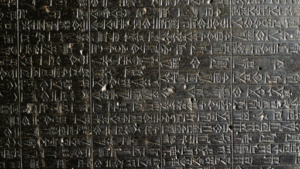 The Mosaic code contains laws, revolutionary at the time, which champion human dignity and the need to show compassion for the outcast, the widow and the foreigner. The Sabbath was given not just as a sign of the covenant relationship between God and the people of Israel but as a means of treating all workers and work animals with respect for their need for rest and refreshment. Even the land was treated with respect and given a Sabbath (Exodus 23:10-12).
The Mosaic code contains laws, revolutionary at the time, which champion human dignity and the need to show compassion for the outcast, the widow and the foreigner. The Sabbath was given not just as a sign of the covenant relationship between God and the people of Israel but as a means of treating all workers and work animals with respect for their need for rest and refreshment. Even the land was treated with respect and given a Sabbath (Exodus 23:10-12).
There are laws that considered the danger of the ‘mob mentality’, the ‘popular poll’ mentality, bribes, and false witnesses that often obstruct justice (Exodus 23:1-9).
Paul Johnson in “The History of the Jews” writes,
“Though the Mosaic code was in this sense part of the Near Eastern tradition, its divergences from the other ancient codes are so many and so fundamental as to make it something entirely new. Firstly, the other law-codes, though said to be inspired by God, are given and worded by individual kings, such as Hammurabi or Ishtar; they are thus revocable, changeable and essentially secular. By contrast, in the Bible, God alone writes the law- legislation throughout the Pentateuch is all His- and no Israelite king was ever permitted, or even attempted, to formulate a law-code. Moses (and, much later, Ezekiel, transmitter of law reforms) was a prophet, not a king, and a divine medium, not a sovereign legislator. Hence, in his code there is no distinction between the religious and the secular- all are one- or between civil, criminal and moral law. This indivisibility had important practical consequences. In Mosaic legal theory, all breaches of the law offend God. Making restitution to the offended mortal is not enough. God requires expiation too, and this may involve drastic punishment” (p. 33 History of the Jews).
Other legal codes saw people as ‘property valued’ according to their ‘usefulness’. Human value would be arbitrarily determined (not unlike modern society that in many cultures puts lesser value on the unborn, the handicapped, females, the elderly or those of another race). The Law of Moses upholds that mankind is made in God’s image and so human life is not just valuable, it is sacred. Murder is a sin against God. Adultery is a sin against God. Money cannot buy off the judge. This law was not written to favor the rich. All are to be held accountable. Kings were subject to the law. When a king of Israel was to take office, he was not only required to read the Law but as a practical discipline he was to personally write it out on a scroll:
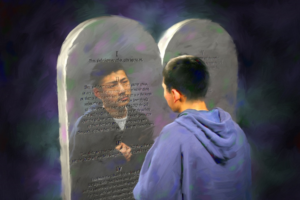 Deuteronomy 17:18-20 (NIV)
Deuteronomy 17:18-20 (NIV)
18 When he takes the throne of his kingdom, he is to write for himself on a scroll a copy of this law, taken from that of the priests, who are Levites. 19 It is to be with him, and he is to read it all the days of his life so that he may learn to revere the LORD his God and follow carefully all the words of this law and these decrees 20 and not consider himself better than his brothers and turn from the law to the right or to the left. Then he and his descendants will reign a long time over his kingdom in Israel.
NEW TESTAMENT READING: MATTHEW 24:1-28.
Jesus makes an outrageous prediction as he leaves the magnificent temple complex in Jerusalem. He points to all of it and says, ‘I tell you the truth, not one stone here will be left on another; everyone will be thrown down.” (Matt 24:2)
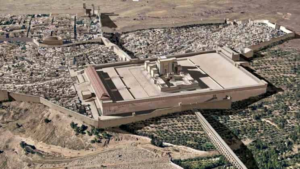 Who could have imagined that within a generation, 40 years, Titus of Rome would order his army to destroy the temple so not one stone is left upon another in order to extract the gold that trickled into the cracks when he had the building set on fire in 70 AD.
Who could have imagined that within a generation, 40 years, Titus of Rome would order his army to destroy the temple so not one stone is left upon another in order to extract the gold that trickled into the cracks when he had the building set on fire in 70 AD.
Flavius Josephus records that the temple was constructed of blocks of white limestone that measured 37.5 feet long, 12 feet high, and 18 feet wide. Some of the remaining blocks weigh nearly 400 tons.
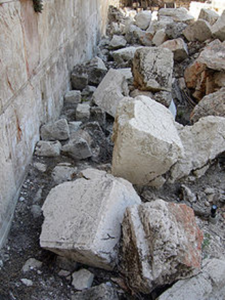 We saw some of these stones that had been excavated at an archeological dig in Jerusalem where they had been cast aside at the temple’s destruction. The Wailing wall is all that remains of the large stone platform upon which the temple once stood.
We saw some of these stones that had been excavated at an archeological dig in Jerusalem where they had been cast aside at the temple’s destruction. The Wailing wall is all that remains of the large stone platform upon which the temple once stood.
As Jesus walks away from the temple, he crosses the Kidron and makes his way up the mount of Olives and answers the disciples’ questions:
- When will this happen?
- What will be the sign of your coming?
- What will be the sign of the end of the age?
What follows is known as “The Olivet Discourse”.
The answer to the question regarding the temple’s destruction is found in Luke’s account:
Luke 21:20-24 20 “But when you see Jerusalem surrounded by armies, then recognize that her desolation is near. 21 “Then those who are in Judea must flee to the mountains, and those who are in the midst of the city must leave, and those who are in the country must not enter the city; 22 because these are days of vengeance, so that all things which are written will be fulfilled. 23 “Woe to those who are pregnant and to those who are nursing babies in those days; for there will be great distress upon the land and wrath to this people; 24 and they will fall by the edge of the sword, and will be led captive into all the nations; and Jerusalem will be trampled underfoot by the Gentiles until the times of the Gentiles are fulfilled.
The answer to the second question, “What will be the sign of your coming?”, is found in Matthew 24:29-44 in which Christ’s glorious coming is described.
As we compare Scripture with Scripture, we learn that Jesus is going to return first for His own (1 Thessalonians 4:16-17; John 14:3), then He will return with His own (Revelation 19:11-16). The sequence is that the church is caught up to meet the Lord before the outpoured wrath on those who have no affection for Him, “those who dwell on the earth”.
Matthew 24:4-14 describe what happens after Herod’s temple is destroyed until the beginning of the tribulation period. (Those who believe this all happened before 70 AD fail to produce the evidence, particularly Jesus’ prediction that “many will come in my Name saying, “I am the Christ”, and will lead many astray.”).
The answer to the third question, “What will be the sign of the end of the age?”, is found in events that Jesus describes particularly from verse 15.
Matthew 24:15 15 “Therefore when you see the ABOMINATION OF DESOLATION which was spoken of through Daniel the prophet, standing in the holy place (let the reader understand),
This event is also referenced by the Apostle Paul in his letter to the Thessalonians. Paul is speaking of the day of the Lord, the end of the age:
2 Thessalonians 2:3-4 3 Let no one in any way deceive you, for it will not come unless the apostasy comes first, and the man of lawlessness is revealed, the son of destruction, 4 who opposes and exalts himself above every so-called god or object of worship, so that he takes his seat in the temple of God, displaying himself as being God.
TODAY’S PSALM: PSALM 29:1-11; THE LORD OVER THE STORMS SPEAKS THROUGH THEM
This is a glorious psalm that employs the sight and sound of a storm developing over the Mediterranean Sea and moving inland across the Middle East Geography from the north, first to the cedars of Lebanon (v. 5) then southwest to Mt. Hermon (Sirion; v.6) to the wilderness of Kadesh (v.8) and south to Jerusalem to speak of the Lord’s power over all creation.
 This is true worship: Ascribe to the Lord glory and strength! As we go through life’s storms, recognize that He is Sovereign over them and speaks to us in them and through them. His voice humbles human pride, the Lebanon’s cedars that stand tall he breaks. His voice brings new birth and causes all to spring to life (v.6, 9).
This is true worship: Ascribe to the Lord glory and strength! As we go through life’s storms, recognize that He is Sovereign over them and speaks to us in them and through them. His voice humbles human pride, the Lebanon’s cedars that stand tall he breaks. His voice brings new birth and causes all to spring to life (v.6, 9).
He is enthroned as King OVER the flood, and over every storm. He is King forever. (v.10) At the end of the storm He will have strengthened His people and blessed them with peace! (v.11)
TODAY’S PROVERB IS A STORY
PROVERBS 7:6-23
Today’s reading from Proverbs is the story of a young man snared by temptation. Although the specific sin referred to is adultery, the scenario applies to any sin. The adulteress represents temptation, which is so alluring, intriguing, wild, flattering, enchanting, accessible, expedient and easy to rationalize. Temptation highlights the easy opportunity of sin but hides the fatal cost.
 Proverbs 7:6-23 6 For at the window of my house I looked out through my lattice, 7 And I saw among the naive, And discerned among the youths A young man lacking sense, 8 Passing through the street near her corner; And he takes the way to her house, 9 In the twilight, in the evening, In the middle of the night and in the darkness. 10 And behold, a woman comes to meet Temphim, Dressed as a harlot and cunning of heart. 11 She is boisterous and rebellious, her feet do not remain at home; 12 She is now in the streets, now in the squares, and lurks by every corner. 13 So she seizes him and kisses him and with a brazen face she says to him: 14 “I was due to offer peace offerings; Today I have paid my vows. 15 “Therefore I have come out to meet you, to seek your presence earnestly, and I have found you. 16 “I have spread my couch with coverings, With colored linens of Egypt. 17 “I have sprinkled my bed with myrrh, aloes and cinnamon. 18 “Come, let us drink our fill of love until morning; Let us delight ourselves with caresses. 19 “For my husband is not at home, He has gone on a long journey; 20 He has taken a bag of money with him, At the full moon he will come home.” 21 With her many persuasions she entices him; With her flattering lips she seduces him. 22 Suddenly he follows her As an ox goes to the slaughter, Or as one in fetters to the discipline of a fool, 23 Until an arrow pierces through his liver; As a bird hastens to the snare, So he does not know that it will cost him his life.
Proverbs 7:6-23 6 For at the window of my house I looked out through my lattice, 7 And I saw among the naive, And discerned among the youths A young man lacking sense, 8 Passing through the street near her corner; And he takes the way to her house, 9 In the twilight, in the evening, In the middle of the night and in the darkness. 10 And behold, a woman comes to meet Temphim, Dressed as a harlot and cunning of heart. 11 She is boisterous and rebellious, her feet do not remain at home; 12 She is now in the streets, now in the squares, and lurks by every corner. 13 So she seizes him and kisses him and with a brazen face she says to him: 14 “I was due to offer peace offerings; Today I have paid my vows. 15 “Therefore I have come out to meet you, to seek your presence earnestly, and I have found you. 16 “I have spread my couch with coverings, With colored linens of Egypt. 17 “I have sprinkled my bed with myrrh, aloes and cinnamon. 18 “Come, let us drink our fill of love until morning; Let us delight ourselves with caresses. 19 “For my husband is not at home, He has gone on a long journey; 20 He has taken a bag of money with him, At the full moon he will come home.” 21 With her many persuasions she entices him; With her flattering lips she seduces him. 22 Suddenly he follows her As an ox goes to the slaughter, Or as one in fetters to the discipline of a fool, 23 Until an arrow pierces through his liver; As a bird hastens to the snare, So he does not know that it will cost him his life.
 There is a warning here for the wise. You have an opportunity when temptation arises, to turn away by choosing another street, staying away from her corner, her house, her couch, long before you fall into the snare and it costs you your life! Be warned: Sin earns a wage- death (Romans 6:23a).
There is a warning here for the wise. You have an opportunity when temptation arises, to turn away by choosing another street, staying away from her corner, her house, her couch, long before you fall into the snare and it costs you your life! Be warned: Sin earns a wage- death (Romans 6:23a).

PRAYER: Lord, give us discernment to stay on a plain path (Psalm 27:11) and not to investigate beckoning streets and alleyways You have marked with warning signals! Thank You for giving us Your Law that has told us “what is good and what You require of us, to do justice, love kindness and walk humbly with You, our God.” (Micah 6:8) We love Your ways. They are perfect. Teach them to us. We see Your ways perfectly articulated in Christ. We look forward to that day when we will see Him face to face. For we know that when He appears, we who are Your children, Father, shall be like You, because we will see You just as You are. Help us to live that way today, seeing You as You truly are, in Jesus! And in His Name we ask it! “And everyone who has this hope fixed on Him purifies himself or herself even as You are pure!” (1 John 3:2-3) Amen!
